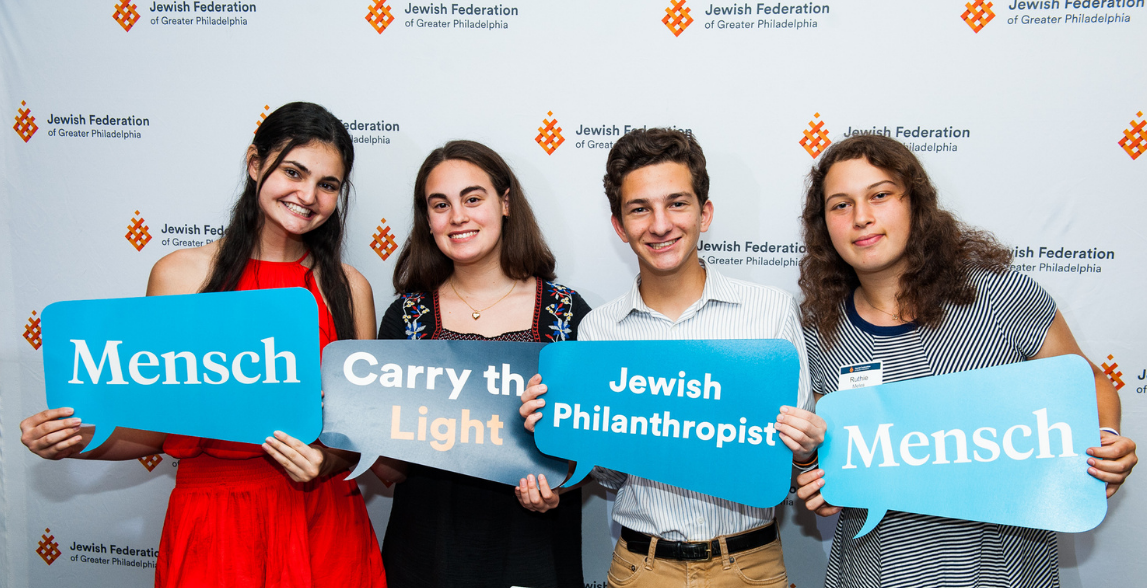by Stefanie Zelkind
Director, JTFN
I’d like to share an “a-ha” moment I recently experienced. For the first time, as he dropped coins in the tzedakah box, my son asked what happens when the box fills up. I told him that we’d give the money to people who need it. “But why don’t they just go to the bank to get more?” A fair question coming from a four-year-old, and one that created a teachable moment not only for him, but for me as a parent and professional.
Educators often talk about “age appropriate” activities – and here at JTFN, how a Jewish teen foundation creates an opportunity for teens to engage in an adult-like process of collective grantmaking, while acknowledging and appreciating participants as teens. To me, this has generally referred to programs building in socializing time and lots of snacks, staff paying attention to group dynamics and peer pressure, and all of the joys and challenges of working with teens and their busy schedules. A recent report shed light on another important way in which Jewish teen philanthropy programs create opportunities that are appropriate for teens and important for their development – they build the kinds of skills that teens are meant to be building exactly at that point in their lives. Jewish teen philanthropy programs create an opportunity for teens to focus on the developmental priorities of adolescence, such as exploring one’s mindsets, beliefs and attitudes and deciding one’s values.
After a comprehensive look at research, theory and practice identified as the building blocks for life success, the University of Chicago Consortium on Chicago School Research published “Foundations for Young Adult Success: A Developmental Framework.” The report identifies three “key factors” to life success: (1) Agency, shaping the course of one’s life rather than simply reacting to external forces; (2) Integrated identity, a strong sense of who one is, which provides an internal compass for actively making decisions consistent with one’s values, beliefs and goals; and (3) Competencies, the abilities to be productive, effective and adaptable to the demands of different settings.
Over time, through developmental experiences, children build four “foundational components,” which underlie the “key factors” to success:
(1)Self-regulation, the awareness of oneself and one’s surroundings, and management of one’s attention, emotions and behaviors to achieve goals.
(2)Knowledge and Skills, information or understanding about oneself, other people and the world, and the ability to carry out tasks.
(3)Mindsets, beliefs and attitudes about oneself, the world and the interaction between the two. They are the lenses individuals use to process everyday experiences.
(4)Values, enduring, often culturally-defined, beliefs about what is good or bad and what one thinks is important in life.
These four qualities develop through every stage of life and reinforce each other. However, the focus development changes as children grow older. And all of these qualities can be directly influenced by the adults in children’s lives (read: not only parents, but program leaders too!).
“Why can’t they just go to the bank to get more money?” My son’s innocent question makes complete sense, given his developmental stage. In early childhood, the primary focus areas are self-regulation and knowledge and skills (#1 and 2 above): he’s becoming more aware of the world around him.
In adolescence, the primary focus areas are #3 and 4: exploring one’s mindsets, beliefs and attitudes and deciding one’s values. Teen participants’ eyes are opened to world beyond their closest circles, allowing for a more expansive and nuanced perspective. Teens work to figure out which values resonate most with them. They examine the sense of responsibility they feel to the multiple communities of which they are a part. First as individuals and then as a part of a collective, teens grapple with competing interests and demands as they determine how to allocate their grantmaking funds. And ultimately, they emerge from the experience with a clearer sense of their values and priorities, a stronger commitment to justice and tikkun olam, and a feeling of empowerment to effect change in the world.
Yes, Jewish teen philanthropy teaches teens about giving. It introduces teens to the nonprofit sector and the range of incredible and inspiring organizations doing important work in their local communities, at the national level, in Israel, and throughout the world. Jewish teen philanthropy teaches teens about team work, active listening, constructive conversations, and group decision-making. And perhaps most importantly, it supports teens as they grapple with essential questions about who they are, what they believe in, what matters to them, and how they’re going to act on their convictions.
As the founding director of JTFN, Stefanie Zelkind has played a crucial role in the growth and development of the field of Jewish youth philanthropy. She got her first taste of collective giving as a co-founder and participant of “No Small Change: A Tzedakah Collective for Women and Girls.” Before joining JTFN, Stefanie served as the National Field Director of the Coalition on the Environment and Jewish Life (COEJL), and the Director of International Affairs for Adam Teva V’Din – The Israel Union for Environmental Defense. She earned a double masters degree in Nonprofit Management and Judaic Studies at New York University, where she was a Wexner Graduate Fellow, and is a 21/64 Certified Consultant in areas relating to teen philanthropy and grantmaking. In just a few weeks, Stefanie will transition to a new professional role as Director of the Wexner Graduate Fellowship/Davidson Scholars Program of the Wexner Foundation in Columbus, OH.
